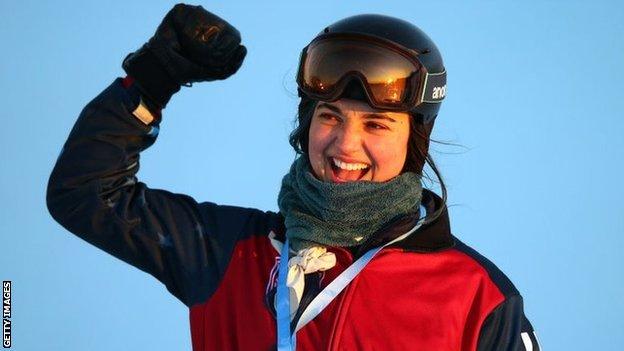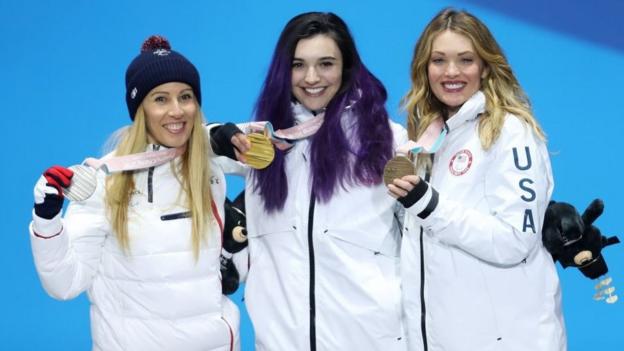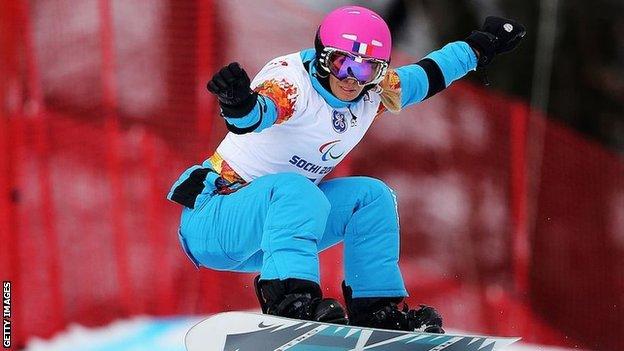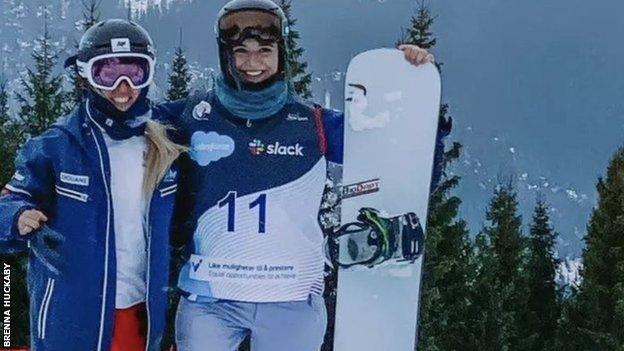[ad_1]

Two Para-snowboarders have won an unprecedented legal battle to compete in this year’s Winter Paralympics after they were initially blocked because they were “too disabled”.
Brenna Huckaby and Cecile Hernandez are long-time rivals on the slopes, but have been united in their fight for equality and inclusion in their sport.
American Huckaby, 25, and France’s Hernandez, 47, filed an injunction against the International Paralympic Committee (IPC) to allow them to compete at the Beijing 2022 Games after their disability class was cut.
The IPC removed their class, arguing that there were not enough women competing within it – and so Huckaby and Fernandez wanted instead to compete either against women with a lower level of impairment or against men in their own classification.
Their application was initially rejected in December by the courts in Germany, where the IPC is based, but this ruling was overturned on appeal on Thursday.
The IPC has said it is “extremely surprised and disappointed” at the decision and that it shows “a lack of understanding of the classification system in Paralympic sport”.
“We eagerly await the court’s written decision because, in our view, the rules for World Para-snowboard could not be clearer: athletes cannot participate in sport classes at the Paralympic Winter Games for which they are not eligible,” said IPC President Andrew Parsons.
“Despite this, the court for whatever reason has dismissed the rulebook and ignored the Beijing 2022 qualification criteria.”
Following the ruling, Huckaby and Hernandez will be able to take part in the Beijing Winter Paralympics, which begin on 4 March, with the Para-snowboarding events starting the following day.
Why did IPC cut category?
Paralympic sports are separated into categories based on the severity of impairment to ensure fair competition between the athletes.
The LL1 classification in which the two women usually compete is for athletes with a “significant impairment in one leg”, while the LL2 is for those with “an impairment in one or two legs with less activity limitation”.
However, at this year’s Winter Paralympics, there will be no LL1 female competition as there were not enough athletes for the events to go ahead – a minimum of six athletes are needed for a medal event.

“We were told in 2019 that we would be able to compete up into LL2, with less disabled women at our own disadvantage, and that was fine,” Huckaby told the BBC. “But then they decided to not allow us to compete at all because we are ‘too disabled’ for the less disabled classification, which was just weird.
“So, for almost the last year I have been fighting them to allow me to simply compete.”
Huckaby, a former gymnast, lost her leg to cancer aged 14 and took up snowboarding as it reminded her of the beam.
She went on to win two gold medals in both LL1 Para-snowboarding events in Pyeongchang 2018 and will now have to wait at least until the 2026 Winter Paralympics in Milan to defend her LL1 titles.
Hernandez has competed in Para-snowboarding since its first inclusion at the Paralympics in Sochi 2014 and joined Huckaby’s legal fight to be included in this year’s Games.
The 47-year-old was diagnosed with multiple sclerosis in 2002 and made the pivot from BMX to snowboarding. The diagnosis has affected her muscle power significantly enough to qualify as an LL1 athlete.

During world championship qualifiers in Lillehammer, Norway, which took place on the same day as the Paralympic appeal was being decided in Germany, both Huckaby and Hernandez recorded times faster than the fastest LL2 para snowboarder.
The pair’s lawyer, Christof Weischemann, used their times and achievements in this latest competition to prove both Huckaby and Hernandez would be competitive in the new category.
“The point of these classifications is to protect the weaker athletes, and by excluding Brenna and Cecile, they were protecting the stronger ones in the competition,” he said.
“This is unprecedented without any other example in in the past as far as I know – I hope it will be a leading case for the future and in the Paralympic movement for inclusion in sport.”
The initial decision to exclude women’s LL1 para snowboarding from Beijing 2022 was made in 2019 and both Huckaby and Hernandez were told they would compete in LL2.
However, when the Games’ official rulebook was released, there was no provision for this, so the IPC told them they could not compete at all.
‘I fought so hard because it’s about all of us’
Para-snowboarders from 12 competing countries. including numerous previous champions and potential medal rivals, signed a petition to the IPC asking for the two women to be included in either the men’s LL1 or women’s LL2 events and the appeal garnered widespread support across the sport.

Huckaby told the BBC she wanted the IPC to stand up for inclusion – and their own mission statement – and allow the two to compete.
“It would’ve been easier to wait and try again in Italy, which is what I was told to do, but I fought so hard because it’s about all of us,” she said.
“We don’t have very many women in our sport to begin with and we need the visibility on the biggest stage we have.”
The German court’s ruling is final and both athletes will compete in Beijing, but the IPC expressed frustration with the court’s decision.
“It goes without saying that the IPC is understanding of Brenna’s cause,” said Parsons.
“She is a world-class athlete and a Paralympic champion who is desperate to compete and represent her country at the very highest level. But she is not alone in wanting to do this.
“However, due to the nature of the event – the pinnacle of Para-sport – not every sport class and sport event can be included.
“As a result, there are always athletes who miss out and are disappointed.”
[ad_2]
Source link

